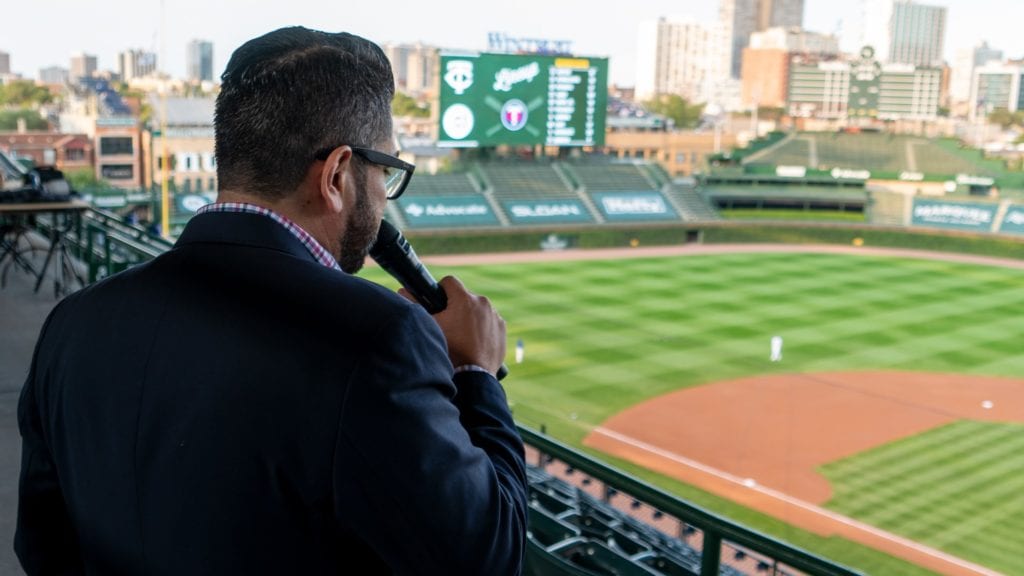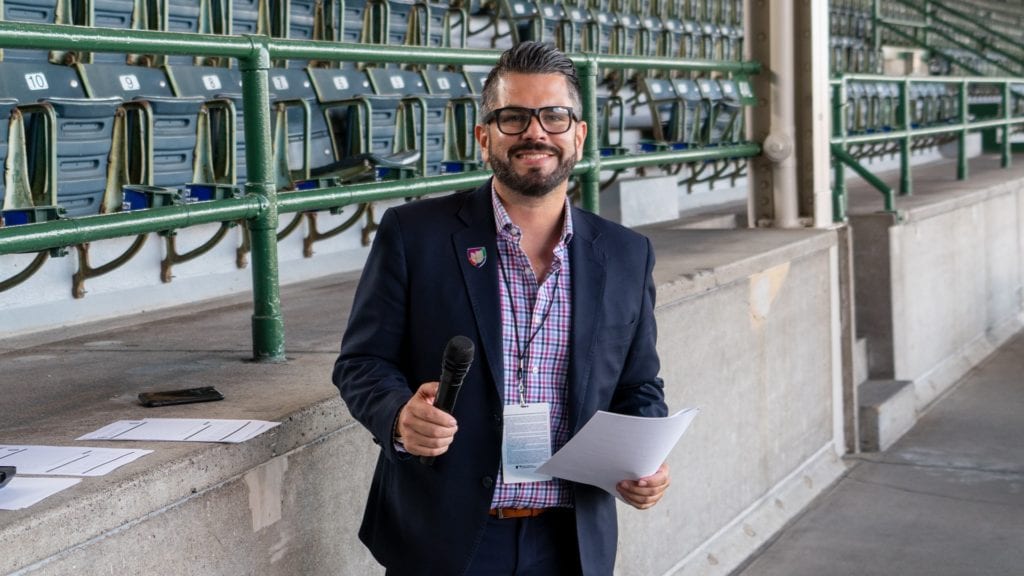From peach orchards to Wrigley Field: How Cubs Spanish radio broadcaster Omar Ramos ‘reached’ the big leagues

As he took his umpteenth trip up the rungs of the ladder laid against the peach tree, Omar Ramos tried not to let his mind drift.
It’d be incredibly easy for that to happen to the young Mexican American picking peaches in the blazing Central California heat. With his face, neck and body covered in the fuzz of the fruit and his legs and muscles aching from the weight of buckets filled with the day’s harvest, fatigue was well set in and made it easy to drift away from the present.
Instead, Ramos would wait for breaks, which could seem like an eternity when you’re out in the extreme temperatures. In those pauses, Ramos would find a shady patch of grass, rest his body on the cool ground, close his eyes and let his imagination flow. More often than not, his daydreams centered around baseball.
“Sometimes I’d just kinda be out on the field and … visualize being involved with Major League Baseball one way or another,” Ramos, the Cubs Spanish radio broadcaster on AM 1200, said of his youth. “I would always dream all the time.”
When he was picking peaches as a youngster in California, the majors may as well have been on Jupiter. But that never stopped the young Ramos from dreaming big. It would have been a disservice to his parents, Ignacio Ramos and Amelia Gutiérrez, if he didn’t.

The elder Ramos and Gutiérrez emigrated from the Mexican state of Michoacán along Mexico’s Pacific coast. They settled in Tulare, Calif., where they worked in the farming industry. The pair raised Ramos and instilled a strong work ethic. That’s why Ramos would awake well before the sun rose, climb up the steps of a ladder with an empty basket and work his way back down with a basket full of the nectarine fruit and do it all over again until around 3 or 4 p.m.
“My summers were not pool parties or travelling to Maui or anything like that,” Ramos said. “It was get ready to bust your butt, man, and do the sorting, the pruning, the harvesting.
“That is hell.”
But it made him that much stronger.
Ramos was enamored by baseball. He followed the Oakland A’s, falling in love with one half of the Bash Brothers (José Canseco) partly because he mashed homers, but partly because of the Spanish name. He played the game using Wiffle balls, tennis balls or whatever he could afford to play with. His mom saved up money to pay for him to play pee-wee baseball because of the passion he had for béisbol.
“She’s always been like that,” Ramos said. “Pursue what fills you and what makes you feel happy about getting up every morning, being passionate about it.”
For Ramos, that craving was baseball. He saved up every cent he collected from his back-breaking work, using it to buy a pack of gum in hopes of getting a prized rookie baseball card.
“I paid for my fetish for baseball cards,” Ramos said. “That was my thing. I had a fetish for baseball cards, man.”
He saved up the cash, hoping he’d pull some great cards and would save up the money to buy himself back-to-school clothes, “cool shoes” and anything else he wanted.
“I learned the value of money,” Ramos said. “Saving up my money obviously for the Walkman, the baseball cards and to have some extra money on the side so I could take that one girl that I had a crush on to, like, the local milkshake joint.”
But that work ethic gave him the mindset and belief that he could reach any goal, regardless of how lofty they may have seemed. He grinded at the farms, worked hard in school and ditched the farm job when he reached high school, trading in the farm heat for the air-conditioned comfort of a McDonald’s.
“I wanted to work somewhere where there was an actual air conditioner going on. And avoid the peach fuzz,” Ramos said.
But the lessons and dreams remained. So he worked his way to Modesto Junior College where he developed a liking for communications. He went on to Fresno State and worked an internship with CBS radio.
In 2003, he finally got his big break. A friend from Fresno had moved out to Chicago and worked for a few radio stations where his general manager was good friends with White Sox owner Jerry Reinsdorf. The White Sox were planning on getting their Spanish radio broadcasts up and running. He auditioned and got his first crack in one of the biggest games possible: the AL Central one-game playoff for the division crown in 2008, dubbed the “Blackout” game.
“I was nervous as heck, but you know, someone needed to do it,” Ramos admitted. “You know a couple hiccups here or there, it’s pretty normal. But that was pretty much what broke the ice and it got me on track with what I needed to do.”

The rest, as they say, is history. Ramos called another season on the South Side before he went up the Red Line to call Cubs games for Univision. His first season was in 2010 with Dale Sveum as manager. He’s been on the call for the Cubs since and shared a special bond with former Cubs manager Rick Renteria.
“What’s crazy is his family is actually from Michoacán, as well,” Ramos said. “When he was here, he embraced us, he embraced what we were doing.”
Ramos experienced the highs and lows of the 2010s for the Cubs. He covered the team in the depths of the rebuild then reaped the rewards of a championship core that won the 2016 World Series.
He still has long work days, although none of them are like the days on the peach orchards.
He’s called Bears, Bulls and Blackhawks games in Spanish. He dropped the Blackhawks this season, but still calls the Cubs, Bears and Bulls in addition to his daytime radio-hosting duties. Sunday, he called the Bears’ game against the Giants, then drove up Lake Shore Drive to Wrigley Field in time to call the home finale against the Twins.
It wrapped up a season that he’s said is “like a science fiction movie.” He’s watched David Ross manage through his first season and lead the Cubs to first place in a wild season.
“All the circumstances that we’re living, he still has the team No. 1, so that’s admirable,” Ramos said. “It’s just like a lesson right in front of your face – through thick and thin, push through.”
If anyone would know about that, it would be the resilient Ramos.


